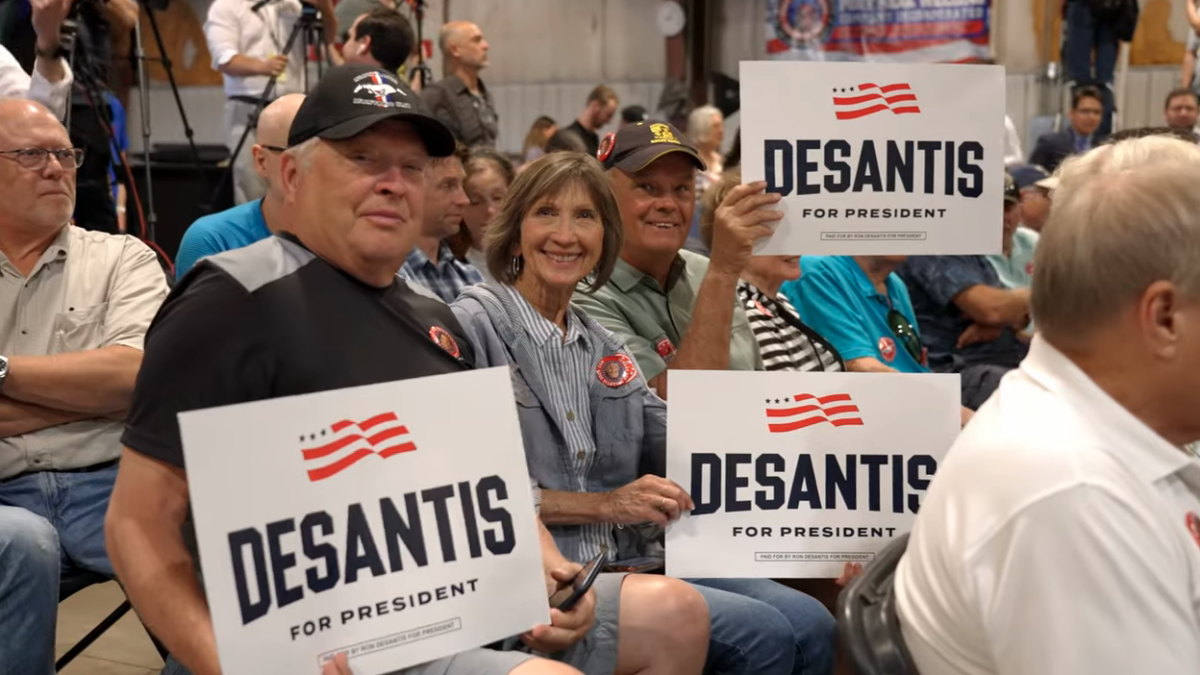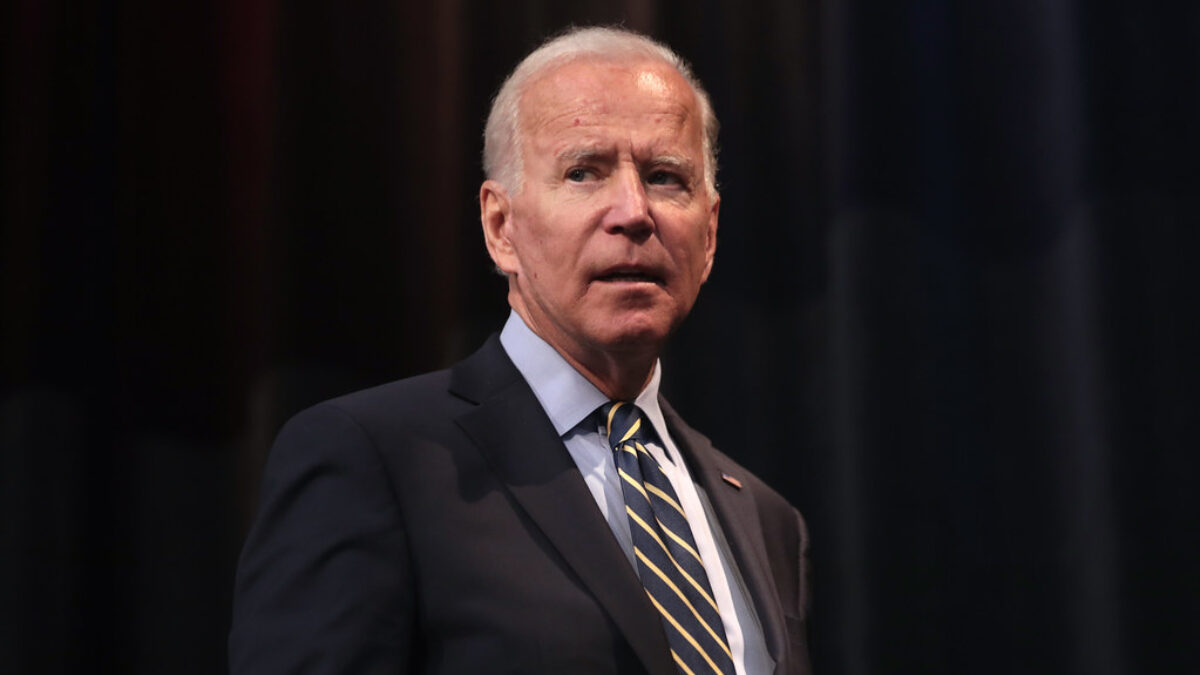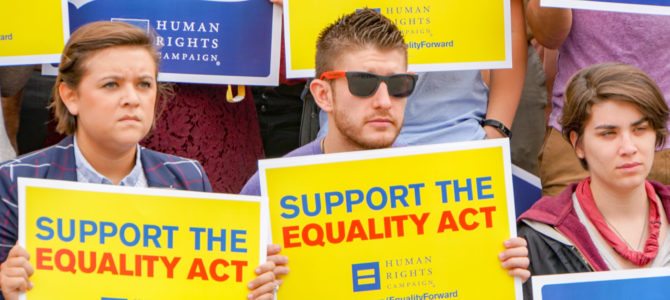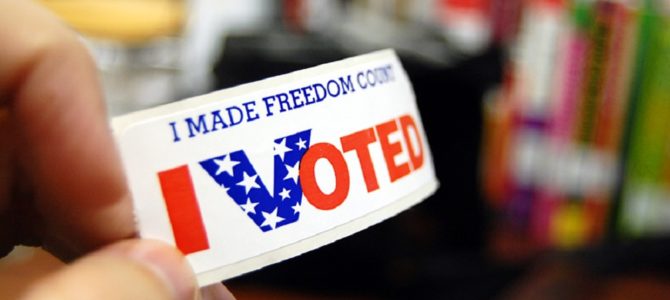The corporate media’s headlines from a recent Des Moines Register poll in Iowa are that Nikki Haley has caught Ron DeSantis, and that she’s on the rise while he’s falling. In truth, the poll reveals that the Hawkeye State continues to look like a two-horse race between DeSantis and the clear front-runner, Donald Trump.
Yes, Haley’s support rose from 6 percent in the prior Des Moines Register poll (taken in August) to 16 percent in this one, while support for DeSantis dipped from 19 to 16 percent. (Trump’s support rose 1 percentage point, from 42 to 43 percent.) But essentially every other indicator in the newly released polling suggests that DeSantis is Trump’s only real competition in this pivotal opening state.
When likely Iowa caucus-goers were asked to name the two candidates whom they like the most, Trump was listed as the first or second choice by 55 percent of respondents, DeSantis by 43 percent, and Haley by 33 percent. (Tim Scott was listed by 17 percent and Vivek Ramaswamy by 13 percent, with everyone else in single digits.) DeSantis was the second choice of 27 percent of respondents, compared with 17 percent for Haley. (Trump was the second choice for 12 percent of respondents, Scott for 10 percent, and Ramaswamy for 9 percent.)
The poll also found that DeSantis had higher favorability ratings among likely caucus-goers than Haley did. DeSantis’ net favorability rating was +43 points (69 percent favorable to 26 percent unfavorable), which is up from +37 in August and is the highest of any GOP presidential candidate. Meanwhile, Scott is at +39 (61 to 22 percent), Trump is at +34 (66 to 32 percent), and Haley is at +30 (59 to 29 percent). (Ramaswamy is only at +6, with 43 percent favorable and 37 percent unfavorable.)
In all, the poll found that two-thirds of likely Iowa caucus-goers are “actively considering” Trump (67 percent), the same percentage who are actively considering DeSantis (67 percent). Only about half are actively considering Haley (54 percent) or Scott (49 percent). About a third (32 percent) are actively considering Ramaswamy.
Not only does Haley trail DeSantis in each of these ways, but the poll provides potentially even worse news for her: If DeSantis were to fade, it would likely benefit Trump and hurt her. A plurality of DeSantis supporters (41 percent) named Trump as their second choice, compared with just 27 percent of DeSantis supporters who named Haley as their second choice.
Conversely, if Haley were to fade, it would likely benefit DeSantis. A plurality of Haley supporters named DeSantis (34 percent) as their second choice, almost three times as many as named Trump (12 percent). If Trump were to start shedding supporters, that too would likely benefit DeSantis, as 41 percent of Trump supporters listed DeSantis as their second choice. Just 16 percent of Trump supporters listed Haley as their second choice, about the same number as listed Ramaswamy (15 percent).
So, likely Iowa caucus-goers gave DeSantis higher favorability ratings than they gave Haley, were more apt to be considering DeSantis than they were Haley, and were more apt to rank DeSantis in the top two than they were Haley. What’s more, if DeSantis does poorly from here on out, it will likely benefit Trump, not Haley — while if Haley dips, it will likely benefit DeSantis. If Trump stumbles, that too will likely benefit DeSantis. None of this suggests that Haley is on the path to victory.
The legacy media have been targeting DeSantis with negative reporting ever since the start of this race, presumably because (A) they don’t like him, and (B) they don’t like President Biden’s chances in a matchup against him. They like Haley more, and they rightly intuit that she stands little chance of winning the GOP nomination and hence doesn’t pose any real threat to Biden.
Establishment Republicans, for their part, are wishfully thinking that Haley can win in Iowa and beyond — much as they thought that Jeb Bush, then Marco Rubio, then John Kasich, could win in 2016. After Kasich had won just one of the first 31 states that year (his home state of Ohio), The Wall Street Journal editorial board still held out hope that he could beat Trump (who had won 20 states) and Ted Cruz (who had won 9) at a contested convention and encouraged him not to drop out.
The Des Moines Register poll — which incorporates Mike Pence’s recent departure from the race, likely to Haley’s slight benefit — was conducted by J. Ann Selzer. Selzer’s poll gets much well-deserved attention because it has historically been Iowa’s most accurate poll. Still, it tends to move a lot in the months leading up to the Iowa caucuses. At this point in 2016, it showed Ben Carson handily winning the state, with 28 percent support to Trump’s 19 percent. (Carson ended up finishing a distant fourth.) The eventual Iowa winner, Cruz, was found to have 10 percent support at that time, edging Rubio (at 9 percent), the eventual third-place finisher.
This time around, Trump has a huge lead, and it would be a major upset if he doesn’t win the Iowa caucuses. But the Des Moines Register polling suggests that if anyone is going to reel in the former president, it will be the popular Florida governor.
Indeed, the race in Iowa looks a lot like the national race has looked from the start: Either DeSantis will convince Republican voters to pass him the baton, or Trump will become the first three-time presidential nominee since Richard Nixon, more than a half-century ago.









